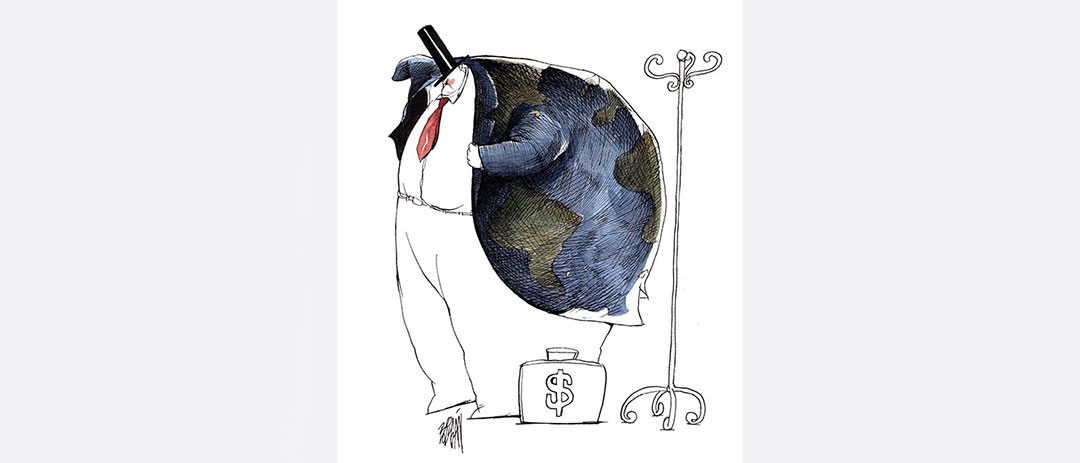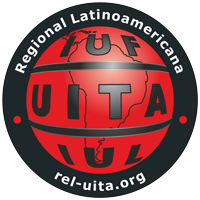World | HR | POVERTY
Pandemic and inequalities
The pit
As expected, the pandemic exacerbated inequalities between countries and between individuals. In a new and detailed report, Oxfam shows just how vast the gap is.
Daniel Gatti

Illustration: Ángel Boligan – Carton Club
Under the very graphic title of “Inequalities kill,” the report indicates that from March 2020—when the COVID tsunami “officially” started—and November 2021—when Oxfam concluded its investigation—while the ten richest men on the planet doubled their already enormous income, another 160 million people joined the already numerous ranks of the poor.
The smallest elite of mega billionaires, which include the owners of technology giants Google, Amazon, Facebook, Apple, and Microsoft, now have a combined wealth of 1.5 trillion dollars, having increased their profits exponentially during the pandemic. In less than 17 months they more than doubled their fortunes.
According to Oxfam, they earn 15,000 dollars per second, 1,300 million per day. That is six times more wealth than what the 3.1 billion poorest people have combined.
“There are those who have had a luxury pandemic,” Oxfam Intermón Director Franc Cortada told the Spanish digital newspaper Infolibre.
At the other end of the spectrum, the 160 million who fell below the poverty line live on less than 5.5 dollars a day.
More than 100 countries—obviously not the richest—were forced to cut back on their meager social plans during the pandemic, and Oxfam predicts they will have to cut back even more once they start repaying the loans granted by financial institutions such as the World Bank and the International Monetary Fund.
The pharmaceutical companies that produced COVID vaccines have been raking in huge profits since March 2020, at a rate of around 86,400,000 dollars a day.
Meanwhile, every four seconds someone—most likely in Africa, Asia, Latin America, or in the fourth-world pockets of the first world—died of hunger or from lack of access to medicines.
Just as money flowed toward the richest, who increased their fortunes, true to capitalist logic, coronavirus vaccines have flowed toward those who could pay for them: less than 5 percent of the population of the poorest countries has been vaccinated.
And the governments of the richest countries, as could be expected, refuse to waive patents for these potentially life-saving products.
In the poorest countries COVID kills twice as many people as it does in rich countries.
Amazon owner Jeff Bezos or Tesla owner Elon Musk—who this year, according to Forbes magazine, became the richest man in history—could have vaccinated everyone on the planet just with what either one of them made in the year and a half of the pandemic.
The widening gaps can also be measured from other angles: in many countries, COVID-19 has proved much more deadly for Black and indigenous people than for White people.
In Brazil, the report notes, Black people are 1.5 times more likely to die from coronavirus than White people. The same is true in first world countries: in the United Kingdom with people of Pakistani or Bangladeshi origin, in France with people of Arabic descent, in the United States with Latinx and Black people, and so on.
As for the gender gap, according to official data accessed by Oxfam, women collectively lost 800 billion dollars in earnings in 2020 alone, and many were forced to leave their jobs and perform unpaid care work at home.
Between 2019 and 2021, the number of unemployed women grew by 13 million, and the report estimates that more than 20 million girls will most likely never return to school.
None of this has happened by accident or should come as a surprise, Oxfam notes. This “is happening by choice, not chance. Not only have our economic structures made all of us less safe against this pandemic, they are actively enabling those who are already extremely rich and powerful to exploit this crisis for their own profit.”
Like many others have, the British NGO calls for imposing higher taxes on the richest and waiving vaccine patents as a way of addressing this situation.
“It has never been so important to start righting the violent wrongs of this obscene inequality by clawing back elites’ power and extreme wealth including through taxation—getting that money back into the real economy and to save lives,” Oxfam International Executive Director Gabriela Bucher, a Colombian national, said.
“While the central banks and the governments of the rich countries injected trillions of dollars to save the economy, a large part seems to have ended in the pockets of the richest who have taken advantage of the boom in the stock markets and other assets,” Oxfam’s Franc Cortada said. “The result, more wealth for a few and more public debt for all.” And this did not come out of nowhere, he insists. It is a consequence of policies.
The NGO’s report was presented at the World Economic Forum, a platform where big business and political leaders, gathered in the mountains of the rich Alpine city of Davos, in the very wealthy Switzerland, go to discuss current global issues.
The most lucid among these characters, united in their defense of market economy, are also surprised at the astronomical rise in inequalities.
Their discussions this year, which like last year’s will be held online, will focus on that issue.
And it is very likely that many of them will arrive at the same conclusion Wall Street guru Warren Buffett voiced some years ago, when he called for higher taxes because, he said, if the world continued down the path it was going, it would lead insensibly to a social explosion that would not be in anyone’s interest. Anyone’s? More like theirs.
“There’s class warfare, all right, but it’s my class, the rich class, that’s making war, and we’re winning,” Buffett, one of the ten richest men in the world, said then.
There is little chance that these billionaires will be willing to give anything more than crumbs, philanthropic initiatives, or more or less insulting patches.
Coming from them, a radical change is definitely out of the question.
